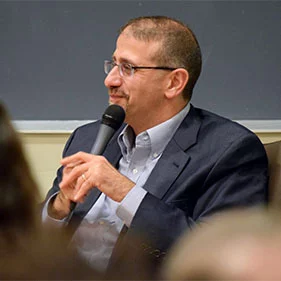‘The flag in human form’

Daniel Shapiro, former U.S. ambassador to Israel, spoke on Nov. 4 at the University
of Wisconsin-Madison Hillel. (Photo by Melissa Simon)
Former U.S. Ambassador to Israel Daniel Shapiro visited the University of Wisconsin-Madison Hillel on Nov. 4 for a moderated question and answer session with local students, faculty and community members.
Shapiro was appointed by President Barack Obama in 2011 and served in the role until the end of his administration. Shapiro managed U.S-Israeli relations throughout Israeli-Palestinian peace negotiations, the negotiation of the Iran Nuclear Deal and a period of widespread unrest in the region.
Shapiro said of his role in the Obama administration that much of his job was to represent U.S. interests to Israeli officials and to the public. “The ambassador becomes the flag in human form,” he said.
Joined on stage by UW political science professor Howard Schweber, Shapiro fielded pre-submitted questions from the audience ranging from President Donald Trump’s decision to withdraw troops from Syria to the evolution of bipartisan support of Israel in the United States.
“It’s been a very chaotic decision,” Shapiro said of the troop withdrawal. “It didn’t arise out of a considered policy discussion. It’s been very jarring to the entire region.”
Shapiro commented on how this move, which allows Iran greater access to territory and weapons, has hampered Israel’s previously high level of support for President Trump: “That obviously has put Israel on its back foot.”
He also pushed back on the argument that the United States is not getting anything in return from the security agreement between the two countries. “It’s not one way,” Shapiro said of the U.S./Israel relationship, citing intelligence, tech and training assets this country receives from Israel. “We derive a lot of benefit too.”
UW-Madison sophomore student Aaron Cohen approaches Ambassador Daniel
Shapiro after the Q&A session to further inquire about Shapiro’s comments on
the state of bipartisan support for Israel in U.S. politics. (Photo by Melissa Simon)
The former ambassador, who currently lives in Israel, shared some recollections from the 2016 election, saying he believed Israeli Prime Minister Benjamin Netanyahu was hoping Hillary Clinton would win the election due to her known quantity as a supporter of Israel — compared to President Trump’s reputation as somewhat of a wild card.
After his prepared remarks, he fielded questions from the student audience on topics such as newly elected members of Congress who have been outwardly critical of Israel, the accusation that Israel is an apartheid state and his experiences as an ambassador in the Obama administration.
In response to a student’s question regarding the difficulties young, pro-Israel activists encounter when supporting progressive politicians’ domestic policies while disagreeing with their stances on Israel, Shapiro said: “One doesn’t have to endorse the entire program of any politician.”
Shapiro also touched on the idea that anti-Israel speech is a “mask” for anti-Semitism, saying: “The idea that the Jewish people in an almost unique way are ineligible for the right to self-determination certainly has a strong whiff of anti-Semitism.” But he also made clear that there is a difference between legitimate “criticism” of Israel and believing that the state has no right to exist.
“Ambassador Shapiro provided so many great pieces of evidence for how students like me can support Israel in discussions with my peers on campus,” Max Bibicoff, a senior at UW, said.
Shapiro’s partner that evening, Professor Schweber, said: “One of the things we talk about a lot is civil discourse, but I’m more worried about intelligent discourse. Today, Ambassador Shapiro put on a master class on both.”
— Will Stern